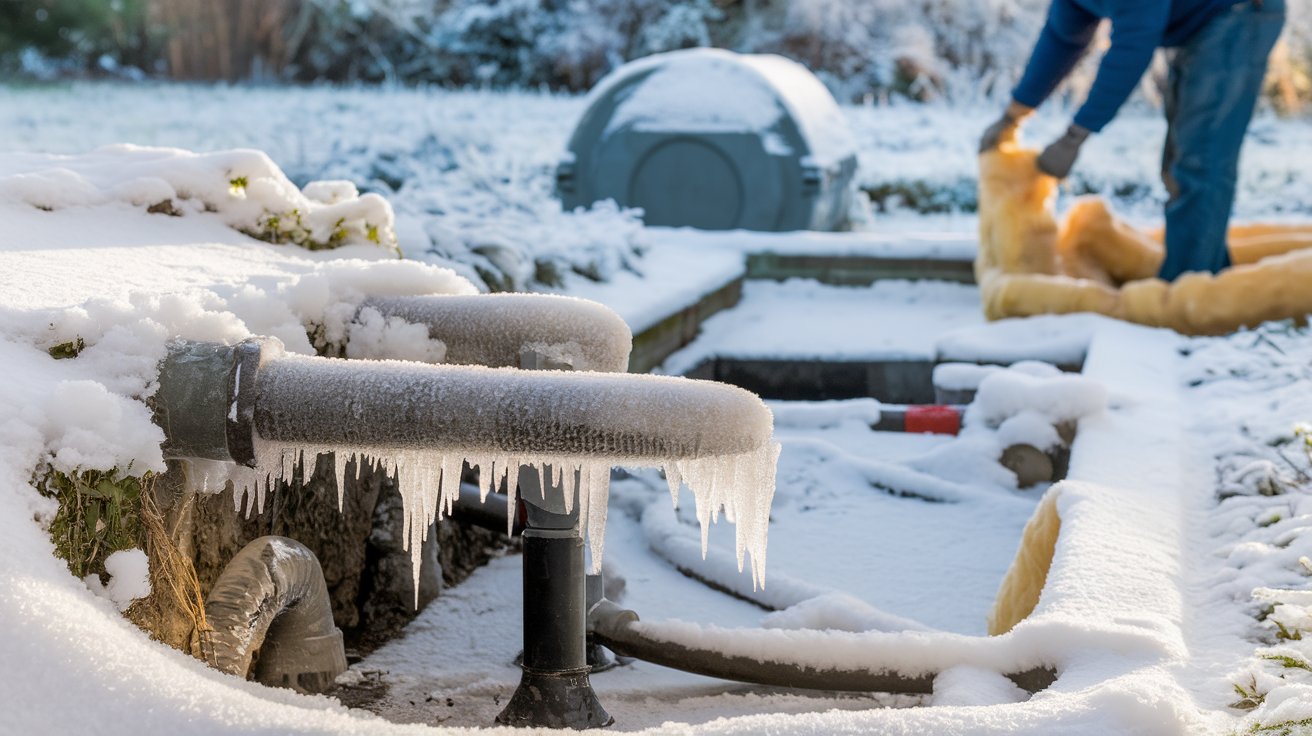As winter sets in, maintaining your septic system becomes even more critical. One of the most common issues homeowners face during the colder months is frozen septic pipes. If not addressed, frozen pipes can lead to system backups, costly repairs, and significant inconvenience. Preventing frozen septic pipes requires proactive steps, such as proper insulation and maintaining a regular water flow. In this article, we’ll explore practical tips for safeguarding your septic system against freezing temperatures, ensuring that your pipes and tank connections remain functional throughout the winter. Keep reading to learn how you can protect your home’s septic system during the harshest months of the year.
Table of Contents
- Why Do Septic Pipes Freeze in Winter?
- Essential Tips for Preventing Frozen Septic Pipes
- Preventing Frozen Septic Pipes: Simple Maintenance Tips
- Emergency Measures for Frozen Septic Pipes
- Septifix
Why Do Septic Pipes Freeze in Winter?
Septic pipes are especially vulnerable to freezing during the winter months due to a combination of cold temperatures and specific system characteristics. When temperatures drop, the water inside the pipes can freeze, blocking the flow of waste and wastewater. Frozen pipes are typically caused by a lack of proper insulation, reduced water flow, or extended periods of freezing conditions.
During winter, if the septic tank or pipes are located in unheated areas or not properly insulated, the cold can penetrate the pipes, causing the water inside to freeze. This can lead to significant issues, including sewage backups, which can damage the entire system. In some cases, a frozen septic system may even require expensive repairs or replacements.
Understanding how and why septic pipes freeze can help you take preventative measures to keep your system running smoothly all winter long.
Essential Tips for Preventing Frozen Septic Pipes
Taking a few proactive steps can significantly reduce the risk of your septic pipes freezing during the winter. Here are the essential tips to keep your system protected:
Insulating Pipes and Tank Connections
One of the most effective ways to prevent frozen septic pipes is to properly insulate them. Insulation helps to maintain the temperature of the pipes, preventing the cold from reaching the water inside. You can use foam pipe insulation or heat tape, both of which are designed to keep pipes warm. Make sure to wrap all exposed pipes, especially those in areas that are prone to freezing, such as crawl spaces or outside walls.
In addition to insulating pipes, consider insulating the connections between the septic tank and the pipes. This is an area where cold air can easily seep in, causing freezing. Proper insulation will keep these connections safe from the cold, ensuring your septic system operates smoothly all winter.
Preventing Frozen Septic Pipes: Why Insulation is Key
When it comes to preventing frozen septic pipes, insulation is one of the most effective solutions. Insulating exposed pipes, especially in areas prone to freezing, helps maintain the temperature inside the pipes and prevents them from freezing in the first place. Whether you use foam pipe insulation, heat tape, or even natural materials like straw, the right insulation can keep your septic system functioning smoothly through even the coldest winter months. Remember, taking this preventative step can save you from costly repairs and system backups.
Maintain a Regular Water Flow
Septic systems are less likely to freeze when water continues to flow regularly through the pipes. Stagnant water in the system can freeze quickly when temperatures drop. To keep water moving, consider running warm water through your drains periodically, especially during particularly cold spells.
You can also encourage consistent water flow by using your system regularly. If you’re away for an extended period, ask a friend or neighbor to flush the toilets or run the faucets every few days to keep the pipes from freezing.
Protecting the Drain Field
The drain field is an important part of your septic system, and it’s essential to protect it from freezing as well. To help retain heat, cover the drain field with a thick layer of mulch, straw, or leaves. This layer acts as insulation, preventing the soil from freezing and keeping the system functioning. Avoid compacting the soil over the drain field by parking or driving heavy vehicles on it, as this can reduce its ability to retain heat.
By taking these steps, you can protect both your pipes and the drain field, ensuring your entire septic system remains operational during the colder months.
Check for Leaks and Repairs Before Winter
Before the cold weather hits, inspect your septic system for any leaks, cracks, or signs of wear and tear. Small leaks or damaged pipes can exacerbate freezing problems by allowing cold air to penetrate the system. If you find any issues, repair them as soon as possible to prevent further damage during winter.
Take the time to check connections, joints, and any exposed pipes. Fixing small issues now will save you from potentially costly repairs later on.
Utilize Septic-Safe Additives
Adding septic-safe additives can help maintain a healthy bacterial balance in your system, which in turn can generate enough heat to keep the pipes from freezing. These additives enhance the natural processes in your tank, allowing it to function efficiently even in cold weather.
However, be cautious about the type of additives you use. Choose products specifically designed for septic systems, as they will not harm the environment or the functionality of your system. Always follow manufacturer guidelines to ensure proper use and safety.
By following these simple steps, you can greatly reduce the likelihood of frozen pipes and ensure that your septic system remains in optimal condition throughout the winter months.
Preventing Frozen Septic Pipes: Simple Maintenance Tips
If you’re unable to locate or thaw the frozen pipe on your own, or if you’re unsure how to proceed safely, it’s time to call a professional plumber or septic system specialist. Frozen pipes can sometimes lead to more severe damage that requires specialized tools and expertise to fix. A professional will be able to quickly assess the situation and determine the best course of action, preventing any further damage to your system.
Emergency Measures for Frozen Septic Pipes
Despite your best efforts, there may still be times when your septic pipes freeze. If this happens, it’s important to take immediate action to avoid further damage. Here are the steps to follow if you suspect your septic system has frozen:
Immediate Steps to Take
If you notice slow drainage or signs that your septic system is freezing, the first thing to do is stop using water until you can address the issue. This prevents more wastewater from flowing into the frozen pipes, which could cause backups.
Next, identify the frozen section of pipe if possible. You may notice that certain areas of your plumbing system are colder than others, or you may spot frost around pipes that are exposed to the cold. If you’re unable to locate the freeze point, you may need to call a professional.
Tools to Thaw Frozen Pipes Safely
Once you’ve identified the frozen pipes, you can begin thawing them. Use heat tape specifically designed for thawing frozen pipes, and apply it to the frozen sections. Heat lamps or space heaters can also help, but they must be used carefully and kept at a safe distance from combustible materials.
Alternatively, if the pipe is accessible, you can pour warm water over the affected area to gradually melt the ice. Never use open flames or high heat sources, as they can damage the pipes or cause a fire hazard.
When to Call a Professional
Preventing frozen septic pipes doesn’t require extensive work, but it does need some attention before the cold weather hits. One of the best ways to prevent freezing is to ensure your septic system is regularly maintained. From checking for leaks and cracks to making sure your tank is adequately insulated, these simple steps can help protect your pipes from freezing. Regular water flow is also essential—make sure to keep water running occasionally, especially during extreme cold, to keep everything flowing smoothly and avoid potential freezing problems.
By acting quickly and following the right steps, you can safely address frozen septic pipes and minimize the risk of extensive damage.
Frozen septic pipes can cause significant disruptions and costly repairs if not properly managed. However, by taking preventative measures—such as insulating pipes, maintaining regular water flow, protecting your drain field, and checking for leaks—you can significantly reduce the chances of your system freezing during winter. Regular maintenance and early detection are key to ensuring your septic system operates smoothly through the colder months.
Don’t wait for a problem to arise—take action now to keep your septic system in top condition. Need expert advice or products for winter septic care? Explore our recommendations for effective solutions to protect your system all season long.
Septifix







